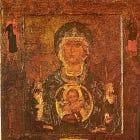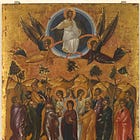on the “conversion” or the “turning” of the soul
But if someone is able to turn around . . . he will see God and himself and the All . . . ; when he has nowhere to set himself and limit himself and determine how far he himself goes, he will stop marking himself off from all being.1
—Plotinus
Many people may be able to relate to the notion of a “conversion” or a “turning” at some point in their lives. While not everyone has a “Damascus experience,” like Saint Paul, and finds himself cast off of his horse and drawn up to “the third heaven,”2 or has any clue what Plotinus is talking about in the epigraph above, still, at some point in our lives we may experience a revolution in our entire paradigm of life and existence. Just as the Sun’s power is caught up the diverse plant species and articulated into myriad forms, so each person’s biography has a certain signature or geometry to it that seems to pattern the flow of their lives, and influence whether such a transformation, should it occur, is to happen violently, peacefully, at once, or by degrees, a single time, or progressively through life. I imagine that, for some, the revolution never comes for the reason that a rose that delays too long will never bloom,3 whereas for others, it never comes because they were somehow blessed with clear-sightedness from the beginning. But for others, the moment does arrive and I’d like to explore it briefly.
What does such a conversion consist in and how it be described? First, I would like to invoke Plato’s presentation of such a turning, from the iconic “Allegory of the Cave,” in which he iconically portrays the
turning the soul from day that is a kind of night, to true Day—the ascent to what is, which is to say, true Philosophy.4
Plato elaborates on the situation with us:
our argument shows that the power and capacity of learning exists in the soul already; and that just as the eye was unable to turn from darkness to light without the whole body, so too the instrument of knowledge can only by the movement of the whole soul be turned from the world of becoming into that of Being, and learn by degrees to endure the sight of Being, and of the brightest and best of Being, or in other words, of the Good.5
In the Allegory, the fire in the cave represents the Sun in what we call “the world,” whereas the Sun in the allegory represents the Idea of the Good in reality. In other words
fire:Sun::Sun::the Idea of the Good
In the same book, Plato describes “the Idea of the Good” as that which imparts “truth to the objects of knowledge and the power of knowing to the knower”
He continues:
the idea of the Good…you must conceive it as being the cause of knowledge, and the cause of truth in so far as they become known…
But as for knowledge and truth, even as in our illustration it is right to deem light and vision as being sun like, but never to think that they are the sun, so here, it is right to consider these two (knowledge and truth) as being like Ἀγαθόν but to think that either of them is the Good, is not right.”6
What does Plato mean by “the Idea of the Good”? An idea is a condition for perception. It can be thought of as “a way of seeing” and “a means of perceiving.” The word itself has Latin siblings in the words “video” and “vision,” and even a Germanic cousin the word “wisdom.” The initial consonant is absent in Greek while in Latin it appears as a “v” and in Saxon, a “w.” More on this below.
Suffice it to grasp that ideas render intelligible a world that without such ideas is actually no world at all. If it were possible to “extract” the “idea of the cosmos” from the actual cosmos, it would not be a cosmos anymore but a chaos. Meister Eckhart said “a stone would be nobler, insofar as it possesses being, than God and his divinity without it, if it were possible to deprive God of being.”7 “Being” here is being employed as a synonym for “essence,” which is the rough Latin equivalent of eidos-idea in Greek, which are the neuter and feminine forms of the same word, respectively. “The world” itself, to be perceived, must be conceived as a coherent whole and this is impossible without a theory of “the world” to organize all of our discreet perceptions of it. The idea or theory constitutes the intelligible aspect of the world and in this way represents necessarily conditions for the activity of perception as such.
So much for “idea.” What about “the Good”? When we do something, or love something, we love it because of the Good that we perceive in that thing. This is axiomatic, as can be seen by turning the situation around and trying to conceive what it would mean to say “I love such and such a thing because I perceived that it was bad” or “I did such and such a thing because I perceived no goodness in the action.” Of course, the sentences are grammatical but they make no sense. Granted, our perception of the Good in things can be warped or distorted, as it is for almost all of us to some degree, to the effect that we perceive through a glass, darkly, and chase after things that seem good to us but are in fact destructive to ourselves and others. Hence, the Good can be understood as the principle of all love and the wellspring of all action. Indeed, these are not two things, for any action is necessarily kindled by a love for the perceived Good in that action, and it makes no difference in this respect whether the perception is true or even if it a tacit perception, as in the form of a habit or instinct. Aristotle conceives of God as the Good and describes God as the cause of all of our actions, not mechanically, but through love:
There is a mover which, not being moved, moves, being eternal and reality and actuality. The desirable and the intelligible move without being moved. The primaries of these are the same ... It moves as loved.8
Of course, if our vision is imperfect, we will be liable to chase illusory goods at the expense of true ones.9 And it’s with this recognition that the need for philosophy becomes apparent. “Wisdom” can be defined “as an adequate Idea of (the) Go(o)d.” This is to say, an Idea of the Good that is not continually sending us down false pursuits of vain and hollow prizes, but one which allows us to turn10 from them towards true Good. Philosophy, then, is the striving for wisdom. Paraphrased, philosophy is the striving to perfect our Idea of (the) Go(o)d so that we love true goods and not specious ones. By the eye of wisdom we discern (the) Go(o)d and on the wings of love we ascend to it. Wisdom lights the way to (the) Go(o)d, and love inspires our limbs to bear us along that way.
Insight into this connection between wisdom and love completes our ordinary concept of philosophy with its complement. In other words, “love of wisdom” is at the same time “wisdom of love.” The preposition stand in for the function of (the) Go(o)d, which makes the many into one without ceasing to be many. Wisdom shows us what to love, and love for (the) Go(o)d is the essence of wisdom. Philosophy is amator sapientae and sapientia amoris alike. The Greek philosophia is ambivalent, like the notorious duck-rabbit.
Enough about Plato’s conception of (the) Go(o)d and the place of philosophy towards it except to observe that this is not a abstract postulate to be disputed by academicians, but an experience to attain to. (The) Go(o)d, once perceived, will become our sole object of love, wherever it manifests, and we will naturally be inspired by the self-evidence of its dessert of our love to seek it and assiduously to refine our soul’s ability to draw nearer to it. In this manner, it moves us as loved, as Aristotle said.11 David Bentley Hart sums up the situation:
No one can freely will the evil as evil; one can take the evil for the good, but that does not alter the prior transcendental orientation that wakens all desire. To see the good truly is to desire it insatiably; not to desire it is not to have known it, and so never to have been free to choose it.12
This brings me to the second feature of the “conversion,” which is inspired by the love for (the) Go(o)d in the same manner that a sunflower is drawn to turn itself and face the Sun. I recall Gurdjieff once stating that the spiritual life begins with the conversion from tea culpa to mea culpa, which is, being interpreted, “your fault” and “my fault.” A similar phenomenon has been identified by the Jungian psychoanalysts as “the withdrawal of shadow projections,” and by Girardians as “the refusal to indulge in the scapegoat mechanism.”13 To some extent, this shift is occasioned by the recognition that there are infinite things that are totally out of our hands in this world, we have privileged access to one small corner of it, viz. ourselves. Why waste time clamoring to change something over which you have no influence rather than set to work to change the one thing you can?
But this is mostly just a rehashing of classical Stoic philosophy. I’d like to go further and suggest that, the conversion also entails a sort of eversion or “turning-inside-out” of the natural attitude towards life. Ordinarily, people identify with adventitious features of their personalities that include preferences, attitudes, and psychological neuroses. This psychological configuration is often indicated by statements like “this is just who I am” or “I’m the kind of person that likes such and such” and is perhaps best characterized by the Augustinian notion of homo incurvatus in se, which is, being interpreted, “man turned in on himself.” “For man has closed himself up, till he sees all things thro’ narrow chinks of his cavern,” as Blake so expressively characterized this condition.14 People in this state are liable to defend their attitudes and neuroses, and even go down into Hades to do battle on their behalf. Following the eversion in question, we cease to identify with our psychological neuroses and call them by their true name, which is “legion” and which are an enemy to ourselves and to everyone around us and which preempt any sustained apprehension of (the) Go(o)d by leaving the psyche in a continual state of agitation. In short, what many people imagine as “just who I am” is really a tent-city of demons that have pitched camp in the psychology and are now proceeding to indenture it to fulfill their purposes. People give quarter to the demons, and cling to them, and justify themselves with statements of the ilk cited above, and refuse to relinquish their grip on them even if it drags them into the pits of Hell, which is where the demons ultimately belong and which is where they all end up as by a sort of “specific-gravity” of the spiritual world that takes effect in the centrifuge of Judgement Day.15
This is what I wanted to say about the “conversion” or “turning” today except for one concluding question that has occupied me for quite some time. When we ask what occasions the relevant conversion in us, the answer can’t exactly be “ourselves” because we are just what need changing. Often it is some circumstance or person who plants a seed, so to speak, and thereby seems to initiate the process. But these circumstances or persons also can’t directly effect the conversion because the seed also has to fall on good ground, as it were. “Grace” is the term for this mystery that it seems can be approached but never apprehended. How should a grasp of the mysterious channels of grace in our lives affect the way we live them?

Plotinus, Enneads (VI.5.7.3–16)
2 Corinthians 12:2
or, scientifically speaking, will be felled by the marauding frost giants of autumn
Plato, Republic, 521c.
Plato, Republic, 518c.
Plato, Republic, 508c - 509a
Meister Eckhart, Selected Writings, “Sermon 14” (167)
Aristotle, Metaphysics Λ.7, 1072a26–27, b3–4
Meister Eckhart says, “you must not place too much weight on your feelings but emphasize rather the object of your love and the object of your striving.” (Selected Writings, 33)
Cf. John 20:
14And when she had thus said, she turned herself back, and saw Jesus standing, and knew not that it was Jesus. 15Jesus saith unto her, Woman, why weepest thou? whom seekest thou? She, supposing him to be the gardener, saith unto him, Sir, if thou have borne him hence, tell me where thou hast laid him, and I will take him away. 16Jesus saith unto her, Mary. She turned herself, and saith unto him, Rabboni; which is to say, Master.
again, quoting from Metaphysics Λ.7, 1072a26–27, b3–4
David Bentley Hart, Radical Orthodoxy “God, Creation, and Evil: The Moral Meaning of creatio ex nihilho.”
Blake, “The Marriage of Heaven and Hell,” The Portable Blake, 300.
C.S. Lewis brilliantly portrayed this phenomenon in The Great Divorce.









When I read your essays about turning of the soul (I enjoy all of them!), I often think about Lot’s wife turning and looking “back” at the city of Sodom and consequently, turning into a pillar of salt – the soul becoming petrified in time and space, unable to move forward (this goes for science as well). It is interesting to note that we can either turn our soul towards situations which hold within them a death force, or alternatively, turn ourselves towards opportunities that hold within them the force of life. Whatever way the soul chooses, there seems to be a trial by fire, in which the soul can choose to wait and experience itself to die to live again in the flames, or the soul cannot endure this experience so it turns back towards that which holds a death force. Of course, so many opportunities are given to us humans in so many different ways to choose true daylight- but you're right in asking, "How should a grasp of the mysterious channels of grace in our lives affect the way we live them?"
"fire:Sun::Sun::the Idea of the Good" this made me glimpse how Steiner's suggestion of Christ as the "spirit of the Sun" might fit. Alan Chadwick would say that the Sun has its own Sun, and there is even the Sun's Sun's Sun.